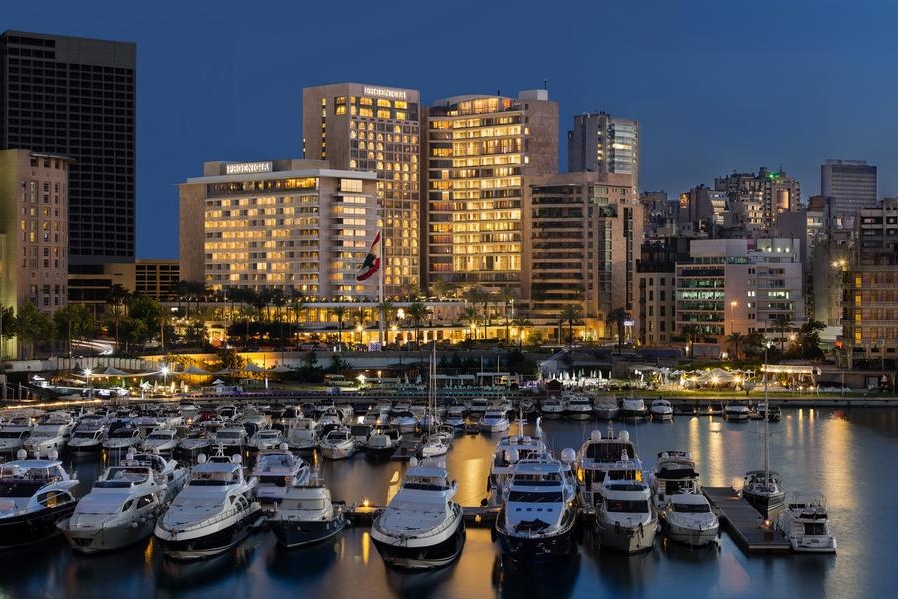By Emma W. Thorne, Editor at LinkedIn News — The workers most opposed to returning to the office full-time? Senior-level executives making …

by Willy Lowry Washington --- The US on Monday joined Saudi Arabia, Egypt, France and Qatar in calling on Lebanon to end its political impasse and elect a new president. The Mediterranean nation has been without a president since Michel Aoun’s term ended on October 31. In the months since, Lebanon’s political leaders have been unable to agree upon a suitable candidate. Lebanon’s complex political make-up centres on a fragile confessional power-sharing scheme in which the presidency is traditionally held by a Maronite Christian, while the office of prime minister is held by a Sunni Muslim. Several prominent Lebanese Christians have been listed as possible options, including Jihad Azour, a former finance minister and regional director at the International Monetary Fund, and Suleiman Frangieh, who has received support from Hezbollah, the highly influential Iran-backed political party.
But in a dozen sessions spanning nearly nine months, the country’s 128 parliamentarians have failed to provide any candidate with the two-thirds majority required to win election on the first vote. “It is crucial for Lebanese members of Parliament to abide by their constitutional responsibility and proceed with the election of a president,” the US State Department said in a joint statement released on Monday by Washington, Saudi Arabia, France, Egypt and Qatar. “In order to meet the aspirations of the Lebanese people and address their pressing needs, it is imperative that Lebanon elects a president who embodies integrity, unites the nation, puts the interests of the country first, prioritises the well-being of its citizens, and forms a broad and inclusive coalition to implement essential economic reforms, particularly those recommended by the International Monetary Fund.”

By Mohammad Ayesh - middleeasteye.net -- Journalist Dima Sadek sentenced to a year in prison A Lebanese court sentenced prominent Lebanese journalist Dima Sadek to one year in prison following a lawsuit by the leader of the Free Patriotic Movement party (FPM) Gebran Bassil, Lebanese newspaper L’Orient Today reported on Tuesday. In the lawsuit filed in 2020, the former foreign minister accused the journalist of "defamation and libel" after she denounced the party for "incitement" and "racism". In a video posted on Twitter, Sadek said she was being accused of "slander, defamation and inciting sectarian strife" for comments she made in February 2020 regarding two young men who were attacked in the northern city of Tripoli by men linked to the FPM.
The journalist had described the attack on one of the men, who was assaulted by the bodyguards of a former FPM lawmaker, as "racist and Nazi". "Gebran Bassil is suing me in the case of Zakaria al-Masri," Sadek said in the video. Sadek was also ordered to pay 110 million Lebanese pounds (about $1,200) in compensation to the FPM, according to court documents. The journalist plans to appeal the decision. "Instead of arresting the attackers who 'incite sectarian strife', a verdict was issued against me," she said. Sadek added that the verdict against her sets "a very, very dangerous precedent on the freedom of journalism, media and expression in Lebanon".
Over two million visit Qatar in six months
Qatar has announced that it has received more than two million visitors in the first half of this year, reflecting a good performance of the tourism sector in the country, according to Al-Khaleej Online news website. The Qatar Tourism Authority said the total number of visitors in the first half of 2023 nearly doubled its level before the coronavirus pandemic. It added that during this period, 51 percent of visitors flew into Qatar, while 37 percent came in by land, and 12 percent by sea.

by Stephen J. Choi, Mitu Gulati & Ugo Panizza -- FT.com (Financial times) Daily Digest -- Stephen Choi and Mitu Gulati are on the law faculties at New York University and the University of Virginia, respectively. Ugo Panizza is a professor of economics at the Geneva Graduate Institute. Lebanon’s debt crisis is a slow moving train wreck. For three years it has been unable to implement reforms necessary for an IMF program — including a requirement to make progress in debt negotiations with private creditors. And when it does move ahead with creditor talks, it faces a heightened risk of holdouts.
Lebanon’s holdout risk derives from its confusing choice to not use Aggregated Collective Action Clauses, or CACs. These clauses, created to ameliorate the problem of holdout creditors, were widely adopted by sovereign debtors starting roughly a decade ago. The innovation allows a debtor to conduct a single aggregated vote across all of its bonds that will be binding, even for dissenters. Holdouts would be deterred, it was thought, because the size of the position needed to hold out would be large. But rather than adopting Aggregated CACs, Lebanon stuck with its old non-aggregated clauses. The end result: Lebanon’s international bonds require the approval of 75 per cent of the holders, in principal amount, for each bond series before key terms can be modified. Those single-series CACs, combined with the fact that Lebanon’s foreign currency bonds are trading at less than ten cents on the dollar, are blood in the water for specialist distressed-debt sharks (see here, here, here and here). But maybe not. Buried in the typical sovereign bond contract is a “manifest error” clause. This section doesn’t get much attention because it covers technical corrections; matters so minor that the debtor and the agents can fix them without approval from the creditors.
To protect against its misuse, the manifest error clause normally comes with two conditions:
1) The changes may not adversely affect the interests of any creditor.
2) The fiscal agent/trustee has to approve the change. Having a trustee who is agent for the bondholders, as opposed to a fiscal agent, is better for the creditors, but that’s not relevant here as we will see.
Khazen History


Historical Feature:
Churches and Monasteries of the Khazen family

St. Anthony of Padua Church in Ballouneh
Mar Abda Church in Bakaatit Kanaan
Saint Michael Church in Bkaatouta
Saint Therese Church in Qolayaat
Saint Simeon Stylites (مار سمعان العامودي) Church In Ajaltoun
Virgin Mary Church (سيدة المعونات) in Sheilé
Assumption of Mary Church in Ballouneh
1 - The sword of the Maronite Prince
2 - LES KHAZEN CONSULS DE FRANCE
3 - LES MARONITES & LES KHAZEN
4 - LES MAAN & LES KHAZEN
5 - ORIGINE DE LA FAMILLE
Population Movements to Keserwan - The Khazens and The Maans
ما جاء عن الثورة في المقاطعة الكسروانية
ثورة أهالي كسروان على المشايخ الخوازنة وأسبابها
Origins of the "Prince of Maronite" Title
Growing diversity: the Khazin sheiks and the clergy in the first decades of the 18th century
Historical Members:
Barbar Beik El Khazen [English]
Patriach Toubia Kaiss El Khazen(Biography & Life Part1 Part2) (Arabic)
Patriach Youssef Dargham El Khazen (Cont'd)
Cheikh Bishara Jafal El Khazen
Patriarch Youssef Raji El Khazen
The Martyrs Cheikh Philippe & Cheikh Farid El Khazen
Cheikh Nawfal El Khazen (Consul De France)
Cheikh Hossun El Khazen (Consul De France)
Cheikh Abou-Nawfal El Khazen (Consul De France)
Cheikh Francis Abee Nader & his son Yousef
Cheikh Abou-Kanso El Khazen (Consul De France)
Cheikh Abou Nader El Khazen
Cheikh Chafic El Khazen
Cheikh Keserwan El Khazen
Cheikh Serhal El Khazen [English]
Cheikh Rafiq El Khazen [English]
Cheikh Hanna El Khazen
Cheikha Arzi El Khazen
Marie El Khazen